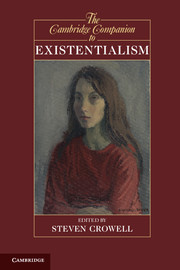Book contents
- Frontmatter
- I Introduction
- II Existentialism in Historical Perspective
- III Major Existentialist Philosophers
- 4 Kierkegaard’s single individual and the point of indirect communication
- 5 “What a monster then is man”: Pascal and Kierkegaard on being a contradictory self and what to do about it
- 6 Nietzsche: after the death of God
- 7 Nietzsche: selfhood, creativity, and philosophy
- 8 Heidegger: the existential analytic of Dasein
- 9 The antinomy of being: Heidegger’s critique of humanism
- 10 Sartre’s existentialism and the nature of consciousness
- 11 Political existentialism: the career of Sartre’s political thought
- 12 Simone de Beauvoir’s existentialism: freedom and ambiguity in the human world
- 13 Merleau-Ponty on body, flesh, and visibility
- IV The Reach of Existential Philosophy
- Bibliography
- Index
- OTHER VOLUMES IN THE SERIES OF CAMBRIDGE COMPANIONS
6 - Nietzsche: after the death of God
from III - Major Existentialist Philosophers
Published online by Cambridge University Press: 28 March 2012
- Frontmatter
- I Introduction
- II Existentialism in Historical Perspective
- III Major Existentialist Philosophers
- 4 Kierkegaard’s single individual and the point of indirect communication
- 5 “What a monster then is man”: Pascal and Kierkegaard on being a contradictory self and what to do about it
- 6 Nietzsche: after the death of God
- 7 Nietzsche: selfhood, creativity, and philosophy
- 8 Heidegger: the existential analytic of Dasein
- 9 The antinomy of being: Heidegger’s critique of humanism
- 10 Sartre’s existentialism and the nature of consciousness
- 11 Political existentialism: the career of Sartre’s political thought
- 12 Simone de Beauvoir’s existentialism: freedom and ambiguity in the human world
- 13 Merleau-Ponty on body, flesh, and visibility
- IV The Reach of Existential Philosophy
- Bibliography
- Index
- OTHER VOLUMES IN THE SERIES OF CAMBRIDGE COMPANIONS
Summary
God is dead; but given the way of men, there may still be caves for thousands of years in which his shadow will be shown. – And we – we still have to vanquish his shadow too … When will we complete our de-deification of nature? When may we begin to naturalize our human selves [ uns Menschen … zu vernatürlichen ] in terms of a pure, newly discovered, newly redeemed nature!
( The Gay Science 108–9)The greatest recent event – that “God is dead,” that the belief in the Christian god has become unbelievable – is already beginning to cast its first shadows over Europe … But in the main one may say … [not] many people know as yet what this event really means – and how much must collapse now because it was built upon this faith, propped up by it, grown into it; for example, the whole of our European morality.
( The Gay Science 343)EXISTENTIALISM, EXISTENTIAL PHILOSOPHY, AND EXISTENZ-PHILOSOPHY
There can be no doubt that Nietzsche figured importantly in the genealogy of existentialism. Along with Kierkegaard, he is commonly considered to have been one of its fathers – or perhaps grandfathers, if its paternity is to be attributed to Martin Heidegger and Karl Jaspers. An argument can certainly be made that Kierkegaard deserves the characterization “existentialist,” his passionate Christianity notwithstanding; for he virtually defined the program of the movement with his famous criticism of “modern philosophy” (that is, Hegel) for “having forgotten, in a sort of world-historical absent-mindedness, what it means to be a human being … each one for himself,” his insistence that “If [one] is a human being then he is also an existing individual,” and his contention that a human being does best to “concentrate his entire energy upon the fact that he isan existing individual.” But is the reinterpretation of human reality that Nietzsche calls for, and undertakes, to be understood at all similarly?
- Type
- Chapter
- Information
- The Cambridge Companion to Existentialism , pp. 111 - 136Publisher: Cambridge University PressPrint publication year: 2012
- 4
- Cited by



